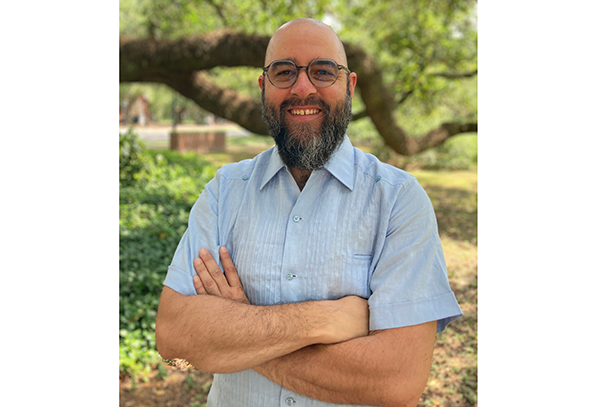Dr. Jorge Villa, assistant professor in the School of Geosciences at the University of Louisiana at Lafayette, is a self-described wetlands scientist. He studies the functions of wetland ecosystems using experimental setups at multiple scales from controlled settings in experimental wetlands to the extensive marshes of the Gulf Coast.
A recent award from the U.S. Department of Energy will help Villa focus specifically on greenhouse gas fluxes in freshwater coastal wetlands and how these fluxes are affected by saltwater intrusion over time.
Villa received the prestigious Early Career Research Award from the U.S. Department of Energy. Under the program, he will receive nearly $750,000 over five years.
Results of Villa’s research will help improve computer models used to estimate methane emissions from wetlands, specifically on how these models deal with changes in water and soil salinity as sea level rises. In addition, student researchers at UL Lafayette will gain experience by working with Villa on this project.
“One of the aspects that excites me about this project is the possibility of being able to support multiple Ph.D. students, which is the single most crucial task of faculty in R1 institutions,” said Villa. “I also hope to attract new undergraduate and graduate students and support postdoctoral stances in my lab.”
Earlier this year, the Carnegie Classification of Institutes of Higher Education designated UL Lafayette a Research 1 university. Only 3% of public and private institutions in the U.S. have earned the top-tier designation.
“Dr. Villa is a respected researcher in geosciences, which makes this Early Career Award a well-deserved one,” said Dr. Azmy Ackleh, dean of the Ray P. Authement College of Sciences. “We are fortunate to have faculty like Dr. Villa who are working to solve regional and global issues facing our world.”
To be eligible for the DOE award, a researcher must be an untenured, tenure-track assistant or associate professor at a U.S. academic institution or a full-time employee at a DOE national laboratory. Selection was based on peer review by outside scientific experts.
“Supporting talented researchers early in their career is key to fostering scientific creativity and ingenuity within the national research community,” said Asmeret Asefaw Berhe, director of DOE’s Office of Science. “Dedicating resources to these focused projects led by well-deserved investigators helps maintain and grow America’s scientific skill set for generations to come.”
Photo caption: Dr Jorge Villa. Submitted photo
